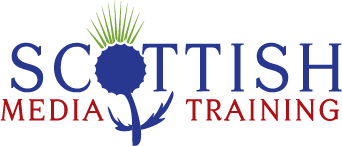Imagine, if you will, a call from the local BBC NewsDesk. They found you on a Google search and you/your business appear perfect for a sequence they are running on this evening’s regional television news programme. You readily agree to appear in front of the camera and be interviewed. It’ll be a breeze. I’ll know their questions in advance and I’ll skate it.
Then, reality REALLY strikes. You’ve never done anything like this before. Panic sets in. Palms become sweaty. Your chest tightens at the very thought of it. Nerves and stress levels are at an all time high. You ask yourself several questions.
- What if I come across as nervous as I am just now?
- What if I’m misquoted?
- If I’m asked a tough question, how on earth will I deal with it?
- What if I wander off-subject and really get myself in a word tangle?
- And.. Social Media? The clip may end up on TikTok, Facebook, Twitter, LinkedIn, Instagram…what then?
These are perfectly valid concerns of course and and knowing how to control an interview is a key part of media training.
So, for those who think that this isn’t you – think again! Never believe that it won’t be you! How many companies and organisations are interviewed every day? Membership Bodies, Trade Unions, Transport Companies, Public Sector Organisations, Charities, Health Boards, I could go on…..every day national and regional television and radio programmes, the broadsheets and tabloids are FILLED with people who never believed that they would need media trained.
Getting to know the common pitfalls in media interviews and the right strategies to overcome them, particularly when experiencing a high-pressure interview.
Who remembers Jeremy Paxman?? His name still makes politicians wince!! That said, it would be rare that an interview would be of that intensity and pressure, but is it not better to be armed with the right strategies to ensure a smooth and trouble free experience?
Media training not only prepares you for confident interactions with the media, but it also gives you useful techniques when presenting to boards, as well as communicating with internal staff, stakeholders and investors. Most important, you understand the benefits of utilising the media to convey your messages.
Today, spokespeople have only one chance to make a good first impression. Media training is vital because your professional reputation and brand messaging depend on it. Think of it as Reputation Management. Media training will teach you how to use words/phrases, tone and body language to deliver a message in a simple, yet powerful way.
Learn the techniques that make you deal with ‘left field’ or ‘off-piste’ questions. It’s as easy as ABC – Answer Bridge Communicate!
Moreover, Media Training will help you think like a journalist. You’ll see things through a journalist lens. By helping identify, anticipate and prepare for tough interview questions you will be more relaxed and exude more confidence. These are great qualities that leave a lasting impression and help you become a sought-after resource.
The media want you to help them. A request for interview should give you confidence that the media is looking to you to as a trusted source of information. It is a fact that in today’s media environment, journalists are asked to do more with fewer resources, often having limited time for fact gathering and qualitative research. As a result, journalists are turning more and more to trusted resources for interview content. You can be that resource!
As we touched upon, media interviews can be daunting, but by blending a series of techniques to develop and enhance interview skills, and you will find speaking to the media gets easier with each interaction.
Finally, the value of building media relationships and how media training can assist in understanding how to form and cultivate those bonds with journalists and reporters can never be over emphasised. Scottish Media Training prepares you for this type of media interaction and make sure you become a ‘go-to’ resource.
Anything from a carefully cultivated television news report using your crafted and measured 20 second sound-bite to a more intense media interview which could impact on external intermediaries and stakeholders – it’s down to us to shape your approach and ensure that reputation is enhanced!
